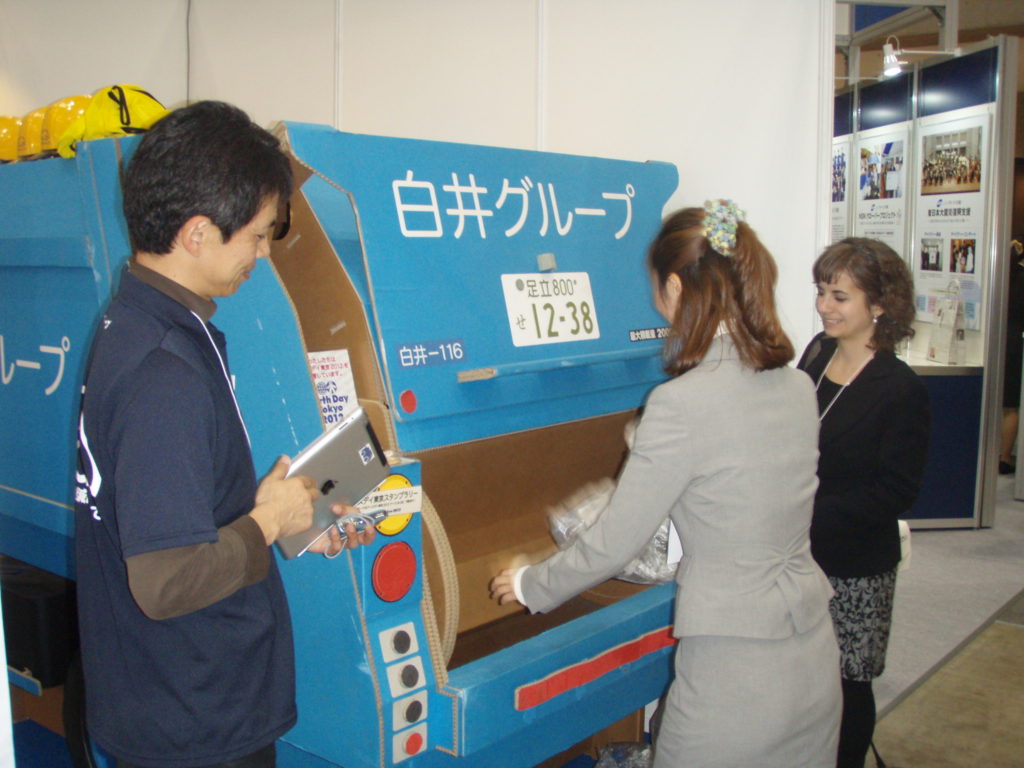Challenge of Globalization Using the Networks of Foreign Internship Students in Japan
CONTENTS
Utilize Foreign Internship Students
“In China burdened with serious environmental problems, the advanced technologies and knowhow of Japanese companies are being called for,” says Hao Hu, the president of Waseda International Environmental Service Co.,Ltd. This company supporting its affiliated company, Waseda Environmental Institute Co.,Ltd, mainly provides consultation on environmental businesses for Japanese companies aiming to expand into the Chinese market. Last year, it was decided that this Waseda Environmental Institute and three other Japanese companies engaged in the waste disposal business would participate in the Dalian National Demonstration District of Ecological Industry, a recycling industry center that is currently being constructed in Dalian, China and expected to be completed soon.
Amid a shrinking domestic market, this is a time when Japanese companies, both large and small, must seriously consider expanding their business overseas. But can’t a company expand overseas if they don’t have any distinguishing technology?
No technology nor money but "information"
“Companies that have no technology or money, like us, just have to rely on information,” says Chiaki Takiguchi, the president of Shirai Eco-center that collects, delivers and disposes of industrial and commercial wastes in Tokyo. The company’s business philosophy shows their strong awareness of globalization, such as “build a global network of waste treatment business” and “collect useful information and excellent personnel for waste treatment business from around the world.”
But why does this seemingly domestic company, which celebrated its 80th year in business last year, have to be so conscious of overseas expansion? The waste treatment business market in Tokyo is fairly large and so “Maybe we will survive if we can share the pie with our competitors satisfactorily,” says Takiguchi. However, he voices his concern in the next breath, “In this age of rapid change, you never know when you’re going to fall into a crisis.” With that, Takiguchi went to the U.S. in 2007 to collect information that might give him some clues for new business. He visited industrial waste disposal plants and recycling facilities, and also interviewed some people that were in the same business. He stresses, “Precisely because we are doing local business, we need to have a global view.” This is because he is concerned that, by being bound by narrow regional customs and rules, they may become unable to see things from a broader perspective and become stuck in inefficient ways of doing business. After coming back from the U.S., Takiguchi kept receiving news from local agents periodically to collect more information. “But I couldn’t get much useful information,” says Takiguchi.
Gathering Information through Foreign Students
He then hit upon the idea of accepting foreign internship students. Takiguchi decided to accept internship students from various countries to learn the situations overseas. He set a goal of building a best model for waste treatment by putting together the best from each country, and expanding their business overseas. Since July 2009, his company has been accepting several foreign students through the Local Committee of AIESEC at the University of Tokyo, which is a nonprofit organization run by students. Takiguchi says, “I think the bonds we establish during our school days are different from business relationships.” He believes that, if Shirai Group can have fans all over the world, they can not only obtain information from various countries but also find future business partners.

In order to make internship students become the company’s fans, they have to make sure they are satisfied. Therefore, the company takes good care of the students, respects their individual initiatives and basically allows them to do the work they wish to do. According to Orsolya Kovacs from Hungary who worked as an intern in Shirai Group for several months last year, she received a big welcome from her very first day including a dinner party and gifts. She was also satisfied with the flexibility of work at the company. She says, “I had heard that internship students would only be given such simple jobs as copying. But I could try my ideas freely in the company.” She is now studying the approaches to CSR in Europe and reporting them at exhibits. She is also working on putting into practice marketing strategies using media.
Eugene Sia, an internship student from Australia, makes a point of the good atmosphere at his workplace. He says, “The office has rather less rules and my Japanese coworkers are so nice and patient to listen to my stories.” Working in the marketing department, Eugene has already been making a big contribution to the company. “He does international marketing and he usually conducts meetings in English,” says Takiguchi expressing his surprise at this outcome. Nevertheless, Eugene is exercising his creativity in the less-rule environment of the company and achieving a good result. It has been decided that he will start working as a full-time employee from April this year. “I’d like to work for the overseas strategies of the company to help it become a global company,” says Eugene of his future hope.
Liu Bei from China is also expected to become a full-time employee of the company in April this year. She is now in charge of office work in the sales department and is satisfied with her current jobs. She says, “I can get involved in various kinds of work such as visiting actual garbage collection sites, learning legal knowledge, accompanying salespeople to see how they conduct negotiations, and learning how to issue a slip and draw up an estimate.” She is expecting the company to expand into China in the future.
Foreign Workers Are Good Stimulus to Japanese Employees.
Such internationalization within the company has been acting as a good stimulus to Japanese employees. According to the company, in addition, when they mentioned the internship system at employment explanation meetings, they could employ higher-level students with strong aspirations to go overseas than in the past. The company hopes to provide these new, higher-potential Japanese employees with opportunities to make the best of their abilities. This is another reason why the company seriously considers overseas expansion.
In addition to the countries mentioned above, Shirai Eco-center has accepted internship students from the U.S., India, Poland and other countries. But has this attempt actually led to business in any case?
Takiguchi says, “Our interns from Poland and India have made proposals for business projects in their countries.” He says that the proposals still need to be refined, but for collection and recycling of electronic waste in India, the company plans to take concrete action starting with visiting Mumbai and Chennai to find alliance partners. “In the future also, if we receive any proposal for waste treatment business from our interns who have returned to their countries, we will consider investments positively,” says Takiguchi.


